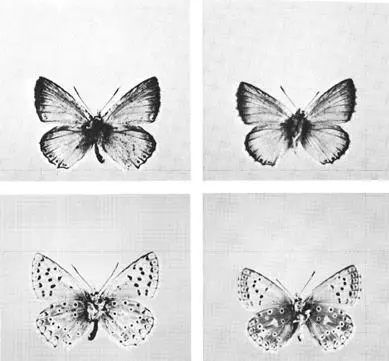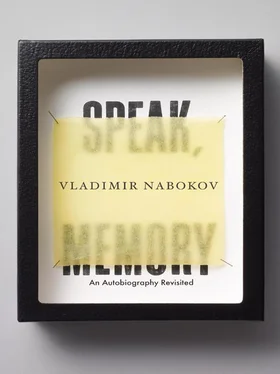Vladimir Nabokov - Speak, Memory
Здесь есть возможность читать онлайн «Vladimir Nabokov - Speak, Memory» весь текст электронной книги совершенно бесплатно (целиком полную версию без сокращений). В некоторых случаях можно слушать аудио, скачать через торрент в формате fb2 и присутствует краткое содержание. Город: New York, Год выпуска: 2011, ISBN: 2011, Издательство: Vintage International, Жанр: Биографии и Мемуары, на английском языке. Описание произведения, (предисловие) а так же отзывы посетителей доступны на портале библиотеки ЛибКат.
- Название:Speak, Memory
- Автор:
- Издательство:Vintage International
- Жанр:
- Год:2011
- Город:New York
- ISBN:978-0-307-78773-6
- Рейтинг книги:5 / 5. Голосов: 1
-
Избранное:Добавить в избранное
- Отзывы:
-
Ваша оценка:
- 100
- 1
- 2
- 3
- 4
- 5
Speak, Memory: краткое содержание, описание и аннотация
Предлагаем к чтению аннотацию, описание, краткое содержание или предисловие (зависит от того, что написал сам автор книги «Speak, Memory»). Если вы не нашли необходимую информацию о книге — напишите в комментариях, мы постараемся отыскать её.
Conclusive Evidence
Lolita
Pnin
Despair
The Gift
The Real Life of Sebastian Knight
The Defense
Speak, Memory — читать онлайн бесплатно полную книгу (весь текст) целиком
Ниже представлен текст книги, разбитый по страницам. Система сохранения места последней прочитанной страницы, позволяет с удобством читать онлайн бесплатно книгу «Speak, Memory», без необходимости каждый раз заново искать на чём Вы остановились. Поставьте закладку, и сможете в любой момент перейти на страницу, на которой закончили чтение.
Интервал:
Закладка:
He looked at his watch, and I looked at mine, and we parted, and I wandered around the town in the rain, and then visited the Backs, and for some time peered at the rooks in the black network of the bare elms and at the first crocuses in the mist-beaded turf. As I strolled under those sung trees, I tried to put myself into the same ecstatically reminiscent mood in regard to my student years as during those years I had experienced in regard to my boyhood, but all I could evoke were fragmentary little pictures: M. K., a Russian, dyspeptically cursing the aftereffects of a College Hall dinner; N. R., another Russian, romping about like a child; P. M. storming into my room with a copy of Ulysses freshly smuggled from Paris; J. C. quietly dropping in to say that he, too, had just lost his father; R. C. charmingly inviting me to join him on a trip to the Swiss Alps; Christopher something or other, wriggling out of a proposed tennis double upon learning that his partner was to be a Hindu; T., a very old and fragile waiter, spilling the soup in Hall on Professor A. E. Housman, who then abruptly stood up as one shooting out of a trance; S. S., who was in no way connected with Cambridge, but who, having dozed off in his chair at a literary party (in Berlin) and being nudged by a neighbor, also stood up suddenly—in the middle of a story someone was reading; Lewis Carroll’s Dormouse, unexpectedly starting to tell a tale; E. Harrison unexpectedly making me a present of The Shropshire Lad , a little volume of verse about young males and death.
The dull day had dwindled to a pale yellow streak in the gray west when, acting upon an impulse, I decided to visit my old tutor. Like a sleepwalker, I mounted the familiar steps and automatically knocked on the half-open door bearing his name. In a voice that was a jot less abrupt, and a trifle more hollow, he bade me come in. “I wonder if you remember me…” I started to say, as I crossed the dim room to where he sat near a comfortable fire. “Let me see,” he said, slowly turning around in his low chair, “I do not quite seem…” There was a dismal crunch, a fatal clatter: I had stepped into the tea things that stood at the foot of his wicker chair. “Oh, yes, of course,” he said, “I know who you are.”

Chapter 14
1
THE spiral is a spiritualized circle. In the spiral form, the circle, uncoiled, unwound, has ceased to be vicious; it has been set free. I thought this up when I was a schoolboy, and I also discovered that Hegel’s triadic series (so popular in old Russia) expressed merely the essential spirality of all things in their relation to time. Twirl follows twirl, and every synthesis is the thesis of the next series. If we consider the simplest spiral, three stages may be distinguished in it, corresponding to those of the triad: We can call “thetic” the small curve or arc that initiates the convolution centrally; “antithetic” the larger arc that faces the first in the process of continuing it; and “synthetic” the still ampler arc that continues the second while following the first along the outer side. And so on.
A colored spiral in a small ball of glass, this is how I see my own life. The twenty years I spent in my native Russia (1899–1919) take care of the thetic arc. Twenty-one years of voluntary exile in England, Germany and France (1919–1940) supply the obvious antithesis. The period spent in my adopted country (1940–1960) forms a synthesis—and a new thesis. For the moment I am concerned with my antithetic stage, and more particularly with my life in Continental Europe after I had graduated from Cambridge in 1922.
As I look back at those years of exile, I see myself, and thousands of other Russians, leading an odd but by no means unpleasant existence, in material indigence and intellectual luxury, among perfectly unimportant strangers, spectral Germans and Frenchmen in whose more or less illusory cities we, émigrés, happened to dwell. These aborigines were to the mind’s eye as flat and transparent as figures cut out of cellophane, and although we used their gadgets, applauded their clowns, picked their roadside plums and apples, no real communication, of the rich human sort so widespread in our own midst, existed between us and them. It seemed at times that we ignored them the way an arrogant or very stupid invader ignores a formless and faceless mass of natives; but occasionally, quite often in fact, the spectral world through which we serenely paraded our sores and our arts would produce a kind of awful convulsion and show us who was the discarnate captive and who the true lord. Our utter physical dependence on this or that nation, which had coldly granted us political refuge, became painfully evident when some trashy “visa,” some diabolical “identity card” had to be obtained or prolonged, for then an avid bureaucratic hell would attempt to close upon the petitioner and he might wilt while his dossier waxed fatter and fatter in the desks of rat-whiskered consuls and policemen. Dokumentï , it has been said, is a Russian’s placenta. The League of Nations equipped émigrés who had lost their Russian citizenship with a so-called “Nansen” passport, a very inferior document of a sickly green hue. Its holder was little better than a criminal on parole and had to go through most hideous ordeals every time he wished to travel from one country to another, and the smaller the countries the worse the fuss they made. Somewhere at the back of their glands, the authorities secreted the notion that no matter how bad a state—say, Soviet Russia—might be, any fugitive from it was intrinsically despicable since he existed outside a national administration; and therefore he was viewed with the preposterous disapproval with which certain religious groups regard a child born out of wedlock. Not all of us consented to be bastards and ghosts. Sweet are the recollections some Russian émigrés treasure of how they insulted or fooled high officials at various ministries, Préfectures and Polizeipraesidiums .
In Berlin and Paris, the two capitals of exile, Russians formed compact colonies, with a coefficient of culture that greatly surpassed the cultural mean of the necessarily more diluted foreign communities among which they were placed. Within those colonies they kept to themselves. I have in view, of course, Russian intellectuals, mostly belonging to democratic groups, and not the flashier kind of person who “was, you know, adviser to the Tsar or something” that American clubwomen immediately think of whenever “White Russians” are mentioned. Life in those settlements was so full and intense that these Russian “intelligentï” (a word that had more socially idealistic and less highbrow connotations than “intellectuals” as used in America) had neither time nor reason to seek ties beyond their own circle. Today, in a new and beloved world, where I have learned to feel at home as easily as I have ceased barring my sevens, extroverts and cosmopolitans to whom I happen to mention these past matters think I am jesting, or accuse me of snobbery in reverse, when I maintain that in the course of almost one-fifth of a century spent in Western Europe I have not had, among the sprinkling of Germans and Frenchmen I knew (mostly landladies and literary people), more than two good friends all told.
Читать дальшеИнтервал:
Закладка:
Похожие книги на «Speak, Memory»
Представляем Вашему вниманию похожие книги на «Speak, Memory» списком для выбора. Мы отобрали схожую по названию и смыслу литературу в надежде предоставить читателям больше вариантов отыскать новые, интересные, ещё непрочитанные произведения.
Обсуждение, отзывы о книге «Speak, Memory» и просто собственные мнения читателей. Оставьте ваши комментарии, напишите, что Вы думаете о произведении, его смысле или главных героях. Укажите что конкретно понравилось, а что нет, и почему Вы так считаете.










